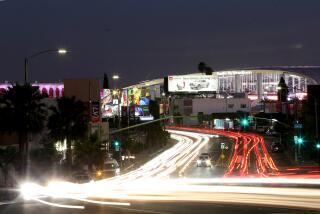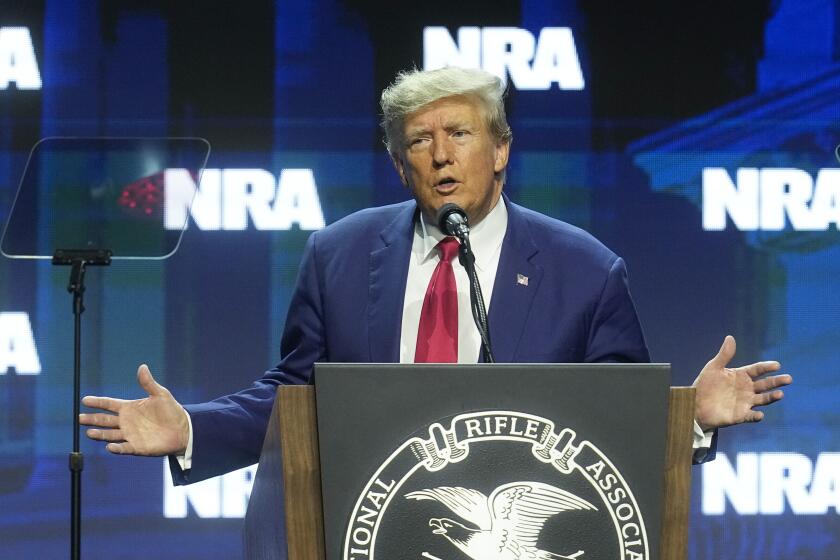Opinion: Inglewood tries to silence a critic with a copyright lawsuit
You might think that a recording of a city council meeting would be a public record owned by, you know, the public.
The Inglewood City Council begs to differ.
The council is suing an Inglewood resident, Joseph Teixeira, and 10 unidentified cohorts for publishing six videos on YouTube that use snippets of recordings from council meetings without the city’s permission. The lawsuit alleges that Teixeira -- whose videos sharply criticize Mayor James T. Butts Jr. -- violated the copyrights the city holds to the recordings, and it demands that he pay the city damages, cover its attorney fees and never violate the city’s copyrights again.
The city’s claim is more than a little disturbing, considering that the target is a resident trying to hold a city official accountable for his words and actions as a city official. As Peter Scheer, executive director of the First Amendment Coalition, put it in a recent blog post, the lawsuit was “cooked up to shut up Teixeira.”
The main problem with the lawsuit, say Scheer and Teixeira’s attorney, Dan Laidman, is that the California Public Records Act effectively renders the city’s recordings uncopyrightable. In a 2009 ruling that barred Santa Clara County from claiming copyright protection for some of its maps, a state appeals court held that local governments can’t claim copyrights over public records unless the Legislature explicitly authorized them to do so. The Public Records Act authorizes copyright claims only for computer software, the court found, adding that the purpose of the act would be subverted if local governments could impose restrictions on how other public records were used.
In court filings, the attorney handling the city’s lawsuit, JoAnna M. Esty, argues that federal copyright law trumps the state public records law. It’s worth noting that federal records cannot be copyrighted, but there’s no such stricture in the law regarding state or local records.
Teixeira’s fallback argument is that his YouTube videos made legal use of the council’s recordings. Federal copyright law states that the “fair use” of a work “for purposes such as criticism, comment, news reporting, teaching (including multiple copies for classroom use), scholarship, or research, is not an infringement of copyright.” But it leaves it up to the courts to decide whether any particular use is fair based on four factors:
“(1) [T]he purpose and character of the use, including whether such use is of a commercial nature or is for nonprofit educational purposes;
“(2) the nature of the copyrighted work;
“(3) the amount and substantiality of the portion used in relation to the copyrighted work as a whole; and
“(4) the effect of the use upon the potential market for or value of the copyrighted work.”
Esty argues in a court filing that the city prevails on all four issues. That’s an odd application of the tests, though. Teixeira’s YouTube postings have no advertising in them and are unmistakably noncommercial political speech. The copyrighted works in question are public records, not Hollywood blockbusters. Teixeira uses only snippets of the city’s recordings in his videos to support specific criticisms he’s making of Butts’ comments at the meetings; the vast majority of the footage is his commentary. And because they include only a few minutes of the proceedings, Teixeira’s videos couldn’t have much effect on the market for recordings of the multi-hour council meetings.
What’s more, the city’s interpretation of copyright law conflicts with one of the core purposes of the 1st Amendment, which is to protect citizens’ rights to speak about the government. The city contends that Teixeira didn’t have to copy the recordings, that he could have simply linked to them (assuming they could be found online). But according to Laidman, Teixeira’s attorney, “courts have made clear time and time again that people are entitled to use portions of copyrighted works in order to comment on them and criticize the ideas and the politics” involved.
In his post about the lawsuit, Scheer stressed the city’s 1st Amendment deficiencies. “If that amendment means anything, it means that government is powerless to use the legal system to suppress political expression that the government dislikes,” he wrote. “Inglewood’s city council members, however, didn’t get the memo.”
California is one of about three dozen states that have enacted laws that prohibit “strategic lawsuits against public participation,” or claims designed to punish people for exercising their right to petition the government and take part in civic debates. Inglewood’s suit against Teixeira seems to be just such a case. Unfortunately for Teixeira, the state’s anti-SLAPP law doesn’t apply to federal lawsuits.
Teixeira has filed a motion to dismiss the city’s complaint, which is scheduled to be heard later this month.
(Full disclosure: Laidman’s law firm, Davis Wright Tremaine, has also represented the Los Angeles Times.)
Follow Healey’s intermittent Twitter feed: @jcahealey
More to Read
A cure for the common opinion
Get thought-provoking perspectives with our weekly newsletter.
You may occasionally receive promotional content from the Los Angeles Times.











